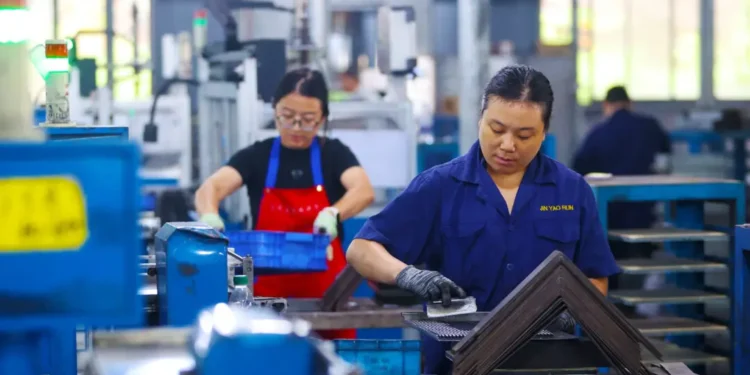China’s economic activities have continued to slow down in August, as a bundle of key indicators fell short of expectations, keeping pressure on Beijing to roll out stimulus amid a prolonged property slump and ongoing trade tensions with the West.
According to data released by the National Bureau of Statistics (NBS) on Sept. 15, industrial production growth slowed sharply in August, rising by 5.2 percent year over year compared to July’s 6.8 percent gain. It missed the 5.7 percent rise expected by economists surveyed by Reuters and represented the worst performance in 12 months.
“We had expected that retail sales growth would have stayed above 4 percent before September under consumer subsidies, so what happened these months was a disappointment,” said Xu Tianchen, senior economist at the Economist Intelligence Unit.
Xu said that China’s main economic indicators could worsen over the fourth quarter due to base effects. Officials typically seek additional policy support toward the end of the year to ensure the economy meets its growth target.
Investment in equipment, buildings, and other fixed assets outside China’s rural households expanded by 0.5 percent between January and August compared to the same period last year, representing a slowdown from the 1.6 percent increase recorded in the first seven months of 2025.
Property investment tumbled by 11.9 percent in the January–August period compared to the same eight-month stretch a year earlier. It represented the worst reading reported since 2020.
“While some of this reflects temporary weather-related disruptions, underlying growth is clearly sliding, raising pressure on policymakers to step in with additional support.”
Separate data released by China’s customs earlier this month show factory owners have had some success diverting U.S.-bound shipments to Southeast Asia, Africa, and Latin America.
However, the ongoing property crisis remains a concern. Fresh data released by the NBS show that new home prices in 70 major cities fell by 2.5 percent in August compared to a year earlier. On a month-over-month basis, the prices slumped by 0.3 percent.
Fu Linghui, a spokesperson for NBS, told a press conference on Sept. 15 that the property sector was still stabilizing, despite some volatility, and more effort was needed to support demand.
Once making up a quarter of China’s economic activity before its collapse four years ago, the property market continues to cloud the outlook for the world’s second-largest economy.
“The property market decline is a key driver behind soft consumer sentiment, which continues to dampen retail sales,” Lynn Song, chief economist at ING Economics, said in a note on Sept. 15.
“As we warned in previous months, signs were that we were near the peak of the stimulus effect from the trade-in policy. As it faded, the risk was that consumption would soften further.”
Additionally, skepticism remains over the reliability of China’s economic statistics, largely because of the Chinese Communist Party’s record of withholding and concealing information deemed harmful to its image.
























